Showing all 5 results
-
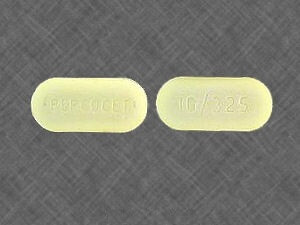
Percocet 10/325mg
Price: $369.00 Select Pills -
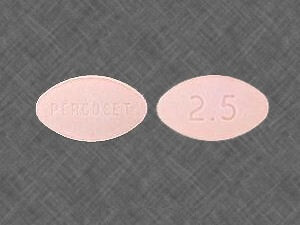
Percocet 2.5/325mg
Price: $319.00 Select Pills -
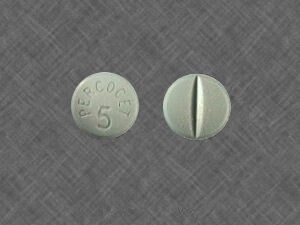
Percocet 5/325mg
Price: $329.00 Select Pills -
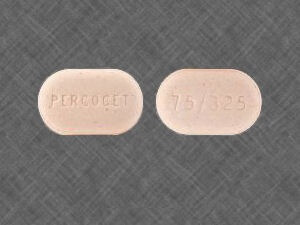
Percocet 7.5/325mg
Price: $339.00 Select Pills -
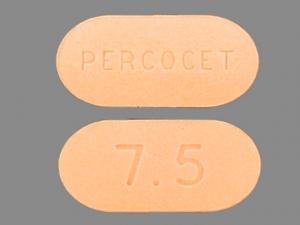
Percocet 7.5/500mg
Price: $349.00 Select Pills
What is Percocet?
Percocet is an FDA-approved opioid pain medication primarily used to treat Back pain and several pain types.
Being a scheduled and controlled drug, its production, distribution, and supply are governed by health authorities. Therefore, buying or selling Percocet without a proper prescription is an act of criminal depravity under the law, and authorities may hold you liable for some penalties if you do so.
You can either buy Percocet online or offline provided that you hold an appropriate prescription from a doctor.
What is Percocet used for, and how does it work?
Being an opioid pain medication, Percocet works on the brain and nervous system to treat moderate to severe pain. It is also an effective medication for fever.
How should it be taken?
Take Percocet as your health expert directs you. Never use it more often than prescribed. Consult your doctor if you are getting addicted to the medicine.
It is always advisable never to share your medicine with anyone with a history of drug abuse and addiction. Misuse, abuse, and addiction to medication can be fatal.
Avoid medical errors and report to your doctor if you are not observing any improvement in your health condition.
Sudden withdrawal of the medicine can be fatal. Please consult your doctor before stopping the treatment; he will gradually decrease your medicine dose to avoid Percocet’s withdrawal symptoms.
Keep Percocet in your custody at the suggested atmospheric condition and dispose of all the leftover medicine once done with the treatment.
How much should it be taken?
Percocet is a prescription medication for treating back pain and moderate to severe pain. The Percocet dosage will vary from patient to patient. Please follow your doctor’s advice or directions on the label.
Your doctor will initiate your treatment with the medicine’s minimum possible dose and gradually adjust your medicine dosage according to your health condition. To determine the best suitable dosages for you, your doctor should examine you thoroughly. Your doctor will recommend Percocet dosage keeping the following factors in mind:
- Age of the patient
- Weight of the patient
- The medical condition of the patient
The following are the usual Percocet dosage that your doctor can prescribe you:
Dosage for treating pain
In the form of oral tablets with the strength of 2.5 mg/325 mg
- For adults
One to two Percocet tablets after every six hours or as and when required
- For children
Using Percocet for treating children is not recommended.
In the form of oral tablets with the strength of 5 mg/325 mg
- For adults
One Percocet tablet orally, after every six hours or as and when required.
- For children
Using Percocet for treating children is not recommended.
In the form of oral tablets with the strength of 7.5 mg/325 mg
- For adults
One Percocet tablet orally, after every six hours or as and when required.
- For children
Using Percocet for treating children is not recommended.
In the form of oral tablets with the strength of 10 mg/325 mg
- For adults
One Percocet tablet orally, after every six hours or as and when required.
- For children
Using Percocet for treating children is not recommended.
What precautions should you take care of while using Percocet?
Percocet is a habit-forming and highly addictive medicine; please consult your doctor before using it. It can adversely affect your health if taken inappropriately. You can easily order Percocet online via a legitimate online pharmacy and use it as per your doctor’s prescription. However, you should take care of the following precautions while using Percocet:
- It is a prescription medication, and therefore it is always advisable to consult your doctor before using it.
- You should not take Percocet if you are allergic to it or any of its components or similar medicines.
- Taking Percocet can adversely affect your health if you have the following health disorders or a history thereof:
- Asthma or other breathing disorders
- Blockage in the stomach or intestine
- Sleep apnea (breathing that stops while sleeping)
- Liver disease
- Kidney disorders
- Head injuries
- Seizures or convulsions
- Problems in the functioning of the gallbladder and pancreas
- Difficult urination
- You can not take Percocet if you are pregnant or breastfeeding; it can harm your child and cause some congenital disabilities to your child.
- Using Percocet might not be safe if you are an alcoholic or drug addict.
- Please consult your physician about all other necessary precautions that should be taken while using Percocet, and talk to them to know more about the Percocet benefits and risks.
Percocet side effects
Please observe your health. You can experience the following side effects after taking Percocet:
- Dizziness or drowsiness
- Tiredness
- Headaches
- Constipation
- Nausea or vomiting
- Pain in the stomach
- Blurred vision
- Itchiness
- Redness in the eyes
- Flushing
- Extreme mood swings
- Dry mouth
Though these common side effects don’t need much medical attention, you should consult your doctor ASAP if they bother you too much or are unbearable.
Please stop taking medicine and tell your doctor if you experience the following health issues:
- Noisy breathing
- Sighing
- Slow or shallow breathing
- Sleep apnea (breathing that stops while sleeping)
- Slow heart rate
- Weak pulses
- Cold and clammy skin
- Lightheadedness
- Weakness or tiredness
- Fever
- Unusual bruising or bleeding
- Confusion
- Mood swings
- Behavioral disorder
- Seizures or convulsions
- Difficulty in urination
- Nausea or vomiting
- Loss of appetite
- Dizziness
- Symptoms of the damaged liver such as pain in the upper stomach, nausea, tiredness, loss of appetite, dark-colored urine, clay-colored stools, jaundice
- High serotonin levels in the body result in diarrhea, vomiting, agitation, hallucination, fever, sweating, nausea, or vomiting, sweating, shivering, fast heart rate, stiff muscles, twitching in the muscles
- Infertility (both in men and women)
- Any other severe allergic reaction to the medicine
Withdrawal symptoms
What to do if an overdose happens?
Percocet can adversely affect you if taken in excess. It can cause the following overdose symptoms:
- Nausea or vomiting
- Unusual sweating
- Drowsiness or dizziness
- Pinpoint pupils
- Slow or shallow breathing
- Breathlessness
You should consult your health expert ASAP if an overdose happens. You can also seek emergency medical assistance by calling the Poison helpline at 1-800-222-1222.
Can Percocet interact with other medicines?
Yes, some medicines can interact with Percocet and adversely affect your health. Please tell your doctor if you are taking the following medication simultaneously with Percocet:
- Antibiotic medicines
- Antifungal medications
- Heart or blood pressure medicines
- Seizure medication
- Medicines to treat HIV
- Medicines to treat hepatitis C
- Cold or allergy medicines
- Asthma or COPD medications
- Medicines for motion sickness
- Narcotic medications
- Opioids pain medication
- Cough medicines
- Any sedative medication such as diazepam, Xanax, etc
- Sleeping pills
- Drugs affecting the serotonin level in the body
- Medicines to treat mental illness
- Anti-anxiety medication
- Antidepressant
Other things you should avoid while using Percocet
Percocet can impair your thought process and cause dizziness or drowsiness; please don’t drive or operate machinery or perform activities that can cause severe dizziness or drowsiness.
Please don’t consume alcohol while using Percocet as it can adversely affect your health.
Taking herbal products, over-the-counter medicines, vitamins, and other nutritional supplements while using Percocet is unsafe.